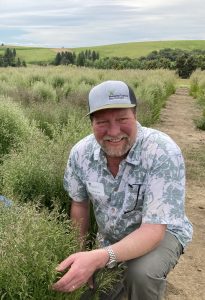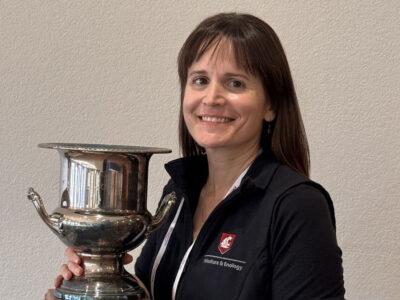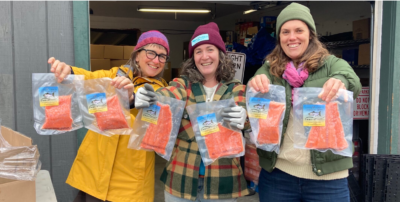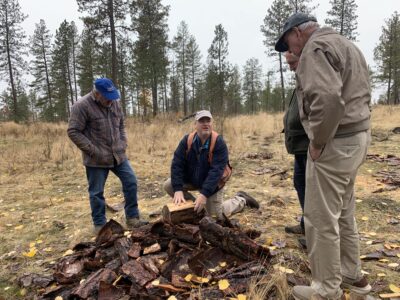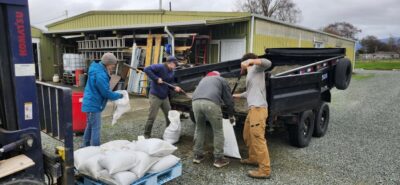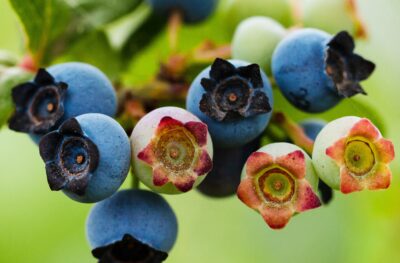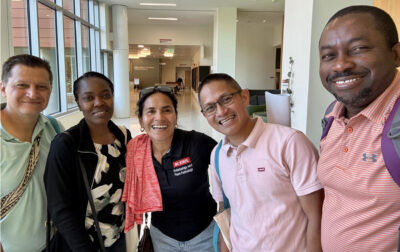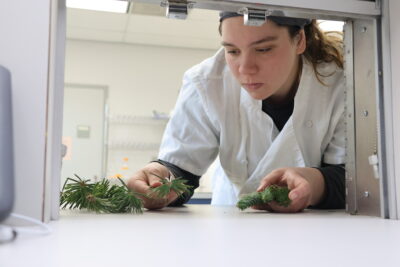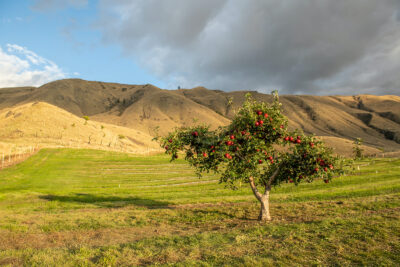WSU Extension research showing goodwill toward neighbors boosts health outcomes
New Washington State University Extension research from the CHORDS Lab in Whatcom County suggests that strong neighborly connections improve health outcomes and reduce stress.
WSU Viticulture Professor and Extension Specialist Michelle Moyer honored for industry impact
In recognition of her impactful research and outreach work, Michelle Moyer received the Walter Clore Award at the annual Washington State Grape Society conference.
WSU uses new grant to improve food access, security on Olympic Peninsula
WSU Clallam County Extension has secured a competitive USDA grant that is helping local farmers, improving nutrition in schools, and reinforcing the regional food supply chain.
Stewardship shortcourse to help eastern Washington forest owners plan their legacy
Upcoming class series is designed for owners of small-scale family forests in eastern Washington who want to protect their land’s health and value.
WSU’s Mount Vernon Research and Extension Center braces for flooding
Leadership at NWREC closed the station Thursday morning and made ready for high water amid evacuation and flood warnings.
New from WSU Extension: Protecting Northwest blueberries, ID’ing pollinators
Fresh guides aid heat-affected blueberry crops, inform Spanish-speaking science volunteers about the pollinators around us.
WSU’s Mount Vernon Research and Extension Center braces for flooding
Leadership at NWREC closed the station Thursday morning and made ready for high water amid evacuation and flood warnings.
WSU plant pathology graduates lead crop-defending clean plant programs across North America
Six WSU plant pathology alumni manage clean plant certification programs in five U.S. states and Canada, defending apples, berries, and other important crops.
WSU researchers explore the scents that drive Christmas tree appeal
WSU sensory experiments inform national research for improved holiday firs that can grow fast and stand up to a month or more of display.
Design-build team with tree fruit industry roots to develop WSU’s new Wenatchee Plant Growth Facility
Development of WSU’s new Plant Growth Facility at Wenatchee is moving forward this fall with help from a newly selected design-build team rooted in regional agriculture.
WSU scientist recognized for research that keeps viruses out of crops, fights those already in
Scott Harper will receive the Excellence in Regulatory Affairs & Crop Security Award from the American Phytopathological Society next month.
Award honors lifetime of plant-disease collaboration by emeritus Tim Murray
Murray is a 2025 recipient of the regional American Phytopathological Society’s lifetime achievement award. He reflects on more than 40 years in science and education.
Dead man’s fingers, alien eggs, and zombies: Unwrapping the weird, charismatic lives of fungi
From the cute to the eerie, explore a vault of more than 76,000 fungal specimens kept for teaching and research that aids human health, agriculture, and the environment.
New WSU program looks to expand early pathogen detection in potato crops
New WSU-led project will help potato growers safeguard domestic and international markets and maintain high-quality potatoes for consumers around the world.
Distinguished USDA, WSU scientist honored with lifetime achievement award
Tim Paulitz recently received a lifetime achievement award from the American Phytopathological Society’s Pacific Division.
USDA undersecretary encounters research for specialty crops at Prosser
A U.S. Department of Agriculture visit shares grant-funded advances in smart technology, virus-free plants, biotic and abiotic stresses, and training the next-generation workforce.
Outstanding individuals honored with 2023 CAHNRS student awards
More than 50 students in WSU’s College of Agricultural, Human, and Natural Resource Sciences were recognized March 30, 2023, during an evening awards ceremony and banquet at Ensminger Pavilion in Pullman, Washington.
State-spanning group of CAHNRS faculty earn promotion in 2023
Twenty-one scientists and educators in WSU’s College of Agricultural, Human, and Natural Resource Sciences received promotion in tenure or career tracks for 2023. Faculty members advancing their careers work in more than a dozen fields
Murray connecting plant, global health as member of National Academies’ Forum on Microbial Threats
Plant pathologist shares expertise to stem the spread of infectious disease
Goodbye, Johnson Hall: WSU Pullman campus’ largest-ever demolition begins
After more than sixty years in service to agriculture, Johnson Hall is coming down.
Dean Wendy Powers joins College of Agricultural, Human, and Natural Resource Sciences
Wendy Powers, the first Cashup Davis Family Endowed Dean, joined WSU’s College of Agricultural, Human, and Natural Resource Sciences on Aug. 15, 2022. Above, she visits the college’s Spillman Agronomy Farm at Pullman (Robert Hubner/WSU…
Plant pathologist Lindsey du Toit named fellow of the American Phytopathological Society
Professor and Extension Plant Pathologist Lindsey du Toit. Internationally recognized for her work protecting valuable seed crops from diseases, Lindsey du Toit has been named a fellow of the American Phytopathological Society. A professor and…
Discovery reveals how fungi bypasses plant defenses, kills plants
Learning how a white mold fungus avoids plant defenses could lead to a new tool to combat a pathogen that causes billions of dollars of crop loss worldwide.
March 19: Tacoma tree planting helps young scientists learn how redcedars can survive changing climate
The iconic Western redcedar may need human help to stay healthy.
Citizen science: Dahlia growers team up with WSU virologist to stop viral diseases’ spread
Researchers join with dahlia enthusiasts to encourage better routine propagation practices.
Viral proteins join forces to lower plants’ defense ‘shields’
Research holds promise to help plants defend themselves, prevent crop losses.
WSU researcher engages communities in tree health research with Forest Health Watch
Members of the public are accelerating research through involvement in Forest Health Watch.
WSU receives $3 million for endowment to bolster food security
WSU announces $3 million gift to establish the Rosalie & Harold Rea Brown Distinguished Endowed Chair in Plant Pathology.
WSU graduate students receive scholarships for advancing Washington wine industry
Four graduate students at Washington State University’s Viticulture and Enology Program have been awarded scholarships from the American Society for Enology and Viticulture. Award recipients Bernadette Gagnier, Margaret McCoy, Alexa McDaniel, and Arunabha Mitra, who study at WSU’s Irrigated Agriculture Research and Extension Center (IAREC) in Prosser, Wash., will be able to use their scholarship […]
What lies beneath: WSU team studies soil-borne potato disease with help from NSF, USDA
Scientists take on a destructive, emerging complex of diseases facing potato growers.
- WSU Extension research showing goodwill toward neighbors boosts health outcomes New Washington State University Extension research from the CHORDS Lab in Whatcom County suggests that strong neighborly connections improve health outcomes and reduce stress.
- WSU Viticulture Professor and Extension Specialist Michelle Moyer honored for industry impact In recognition of her impactful research and outreach work, Michelle Moyer received the Walter Clore Award at the annual Washington State Grape Society conference.
- A tale of two wines: WSU student explores how soil type impacts taste, aroma For her Blended Learning project, Elle Jennings partnered with a WSU alumnus to create two Cabernet Sauvignon wines. One used grapes grown in sandy soil; the other used grapes grown in basaltic soil.
- WSU’s Mount Vernon Research and Extension Center braces for flooding Leadership at NWREC closed the station Thursday morning and made ready for high water amid evacuation and flood warnings.
- WSU plant pathology graduates lead crop-defending clean plant programs across North America Six WSU plant pathology alumni manage clean plant certification programs in five U.S. states and Canada, defending apples, berries, and other important crops.
- WSU researchers explore the scents that drive Christmas tree appeal WSU sensory experiments inform national research for improved holiday firs that can grow fast and stand up to a month or more of display.
- Before the party starts: Parental attitudes linked to college binge drinking College students who binge drink may be acting on influences they brought from home, WSU scientists find.
- ‘Legacy of learning’: Couple donates 100-acre tree farm to WSU Extension Forestry Becky and Lynn Miner have donated their Casa Becca del Norté tree farm to WSU Extension Forestry as a “legacy of learning.” Representing WSU’s first school forest, the acreage includes a residential log cabin and outbuildings that will support education, training, demonstrations, research, conventions, and other learning opportunities.
- Bees thrive in overlooked pockets of Puget Sound New WSU research shows small corners of untended land can sustain bee populations in cities.
- Bacteria could alleviate the smoky taste of wine grapes exposed to wildfires A bacterium that lives on grape plants can break down guaiacol, an unpleasant-tasting substance that ruins wines made from grapes exposed to wildfire smoke, according to new research.
